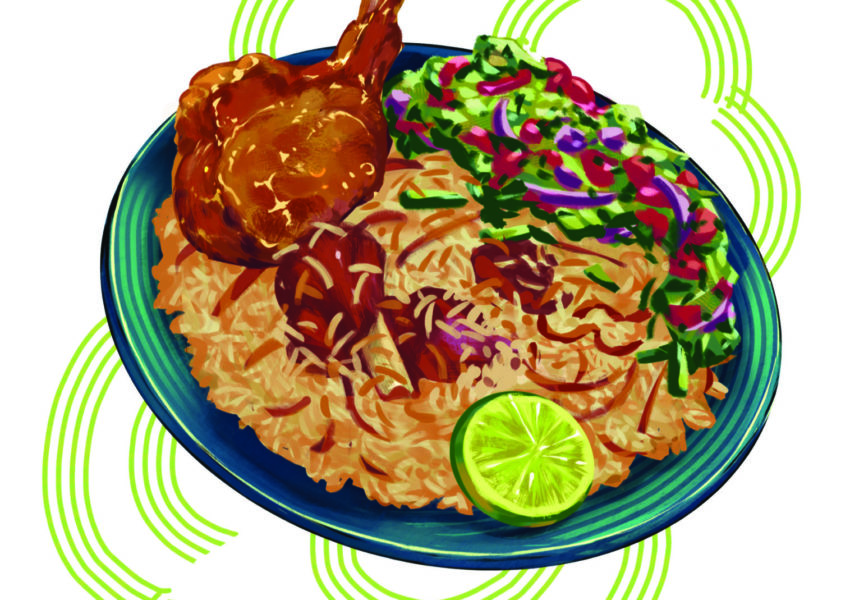Dabble to Dollars There’s money to be made in barbecue sauce. But don’t quit your day job just yet.
Story and photos by Hanna Raskin
![]()
Every bottle of Old Mr. Henry Original BBQ Sauce bears the same slogan, rendered in letters that curve over Henry Freeman’s bearded and bespectacled face like a balloon arch at senior prom: 40 years in a bottle, the label declares.
Ed Freeman, the Bamberg County, South Carolina, magistrate judge who makes Old Mr. Henry, borrowed his brother’s name and picture for the sauce because he didn’t like the equine ring of “Mr. Ed.” And despite what the forty-year statement might imply about age, the tomato-vinegar sauce is freshly bottled, as evidenced by its bright mahogany shine.
Freeman says customers always ask what he does to achieve such an enticing shade. It just comes out that way, he tells them.
But would-be competitors don’t ask about the color. When it comes to barbecue sauce made according to an old family recipe, all they see is green.
“It’s amazing the stories I hear,” says Tim Parrish, the domestic marketing manager for the North Carolina Department of Agriculture and Consumer Services. Parrish often serves as a confidant for sauce concocters with get-rich schemes, most of which involve a prominent Walmart shelf. “People are passionate about their barbecue sauces—and hey, I give them all the credit in the world—but at some point, you have to get them back to reality,” he says.
If you spend any time asking food professionals what drew them to their line of work, you’ll hear about love. Maybe a little bit about Grandma. Sometimes making people happy comes up, but it usually only takes one follow-up question to find out the way they do that is by cooking with love. Just like Grandma.
Barbecue is different in that its practitioners historically haven’t been reticent about acknowledging their financial motives. Perhaps that’s because even lovesick fools would think twice about waking up in the middle of every night, laboring over hog carcasses in temperatures roughly equivalent to Oman in June, and inadvertently burning down their workplace every few years. Whatever the reason, it’s OK for pitmasters to admit they started smoking meat for the money.
In fact, the prospect of profit has become so entwined with barbecue—especially since the advent of barbecue-themed television shows and cook-offs, which yield big checks—that enthusiasts across the South believe the road to fortune is paved with tomato paste and onion powder, usually in about the same proportion: The main variation in a lineup of small-scale sauces from different states is the amount of sugar in the bottle.

There are so many aspiring sauce moguls in South Carolina alone that Brittany Willis, president of the South Carolina Specialty Food Association, can barely keep track of them.
“We have at least seven right here in the catalog, but I could name a couple more,” Willis told me when I asked her to estimate the number of dues-paying members hawking barbecue sauce.
Very few of those artisans will ever turn sauce into a full-time job, let alone a windfall. But the global barbecue market is valued at close to $8 billion and the obstacles to success can seem small, so sauce entrepreneurs are bound to remain a fixture of the region’s barbecue scene.
“It’s an easy food product to kind of dabble in,” Parrish says. “You concoct this recipe [and think], ‘I may actually have something here.’” He continues, “Then the family starts to talk about it, and you start getting it to your friends at church: It’s one of those things that can blow up real quick.”

According to Parrish, barbecue sauce has a few advantages that neither compound sea salt butter nor freshly milled grits can claim. For one, it’s easy for a rookie producer to haul around samples. And for two, sample recipients know just what to do with what they’ve been given.
“Listen, in North Carolina, we love to try barbecue sauce,” Parrish says, adding that impressed friends’ tendency to talk up free sauce on social media enflames producers’ early retirement fantasies.
Parrish’s summary of the dabble-to-dollars trajectory could almost double as the “About” page on many a barbecue sauce maker’s website.
“[Todd] McDonald’s friends were putting that sauce on erythang,” DayYum Sauce, a Lugoff, South Carolina company, explains on its website. As Katie Throne of Athens, Georgia, tells Porky Goodness’ origin story, she gave the sauce “to friends as a holiday gift. They would send me photos of their sad faces next to their empty jars.”
To which Parrish says: “Well, that’s great. Would they buy it from the grocery store? That’s a question you have to ask yourself if you think you can make a living.”
Of course, that assumes the sauce is sold at the supermarket, which is often the biggest hurdle in an industry where big brands dominate. Most sauce aisles are showcases for Sweet Baby Ray’s, the touchstone for sauce startups. “I know it’s too sweet and the texture is too thick, but I turned a $2,000 investment into 21 percent total market share. Not bad for a white boy selling barbecue,” Food Republic quoted founder Dave Raymond as telling a crowd in 2012.
Cracking the hegemony became even harder in 2021 with the dissolution of Bi-Lo—a Southeastern Grocers chain with a reputation for stocking local products—and the continuation of Covid protocols, which often prevented sauce makers from meeting face-to-face with corporate representatives. Freeman, the maker of Old Mr. Henry BBQ Sauce, doesn’t even fuss with groceries, other than a few local stores where he knows the managers. He mostly sticks to the festival circuit.
“When I first started, I thought it would be a lot easier,” he says. “Oh boy, what I did not know.”
In 2014, after working thirty years in management at a nearby nuclear energy plant and then going back to school to study criminal justice, Freeman didn’t know about copackers and distributors. He didn’t know that letters on a bottle label had to be a certain size, or what he’d have to do for various state agencies to sign off on the bandbox wooden outbuilding he uses as a one-man production facility.
“I spent over $6,000, and still they gave me hell on top of it,” he says. “[The South Carolina Department of] Agriculture don’t be messing around.”

Freeman didn’t have designs on great wealth, but he considered jumping into the sauce business akin to the unplanned trips he takes on his Harley Davidson. It seemed like a fun jaunt, and he had the skills needed for the adventure. “Everybody else had a sauce on the market, but everybody’s sauce ain’t good,” he says.
Lines like that, along with the meatballs he splits and sauces for sampling, have helped him sell as many as 480 bottles of sauce at multiday events such as the Southeastern Wildlife Exposition in Charleston. He charges seven dollars a bottle, netting a few bucks in profit. Like many sauce entrepreneurs, he’s learned to keep his costs down by peddling just one product as the solution to all flavor problems.
“I started out with steak sauce too [and] kind of backed off that,” he says. “You try to do too many things and it gets to be really expensive. You got to keep to where the money’s at.”
As for the forty-year motto on the front of the signature bottle, it doesn’t mean anything. Freeman’s father, who cooked hogs over a backyard pit, started making a similar sauce long before that. Freeman picked the figure because it sounded persuasive, same as the very tasty endorsement scripted beneath it.
Yet he might just make it come true.
“You’re not going to make a ton of money,” he says. “My plan is to keep on going like I’m going.”
Because, after all, making sauce isn’t overly complicated: Freeman can bottle and talk on the phone at the same time. Plus, festival organizers keep asking him to set up a booth in their vendor tents.
“Man, you talk about eating up some stuff,” he says of festivalgoers’ enthusiasm for free samples. Most tasters declare, “Ooh, that’s so good,” and walk away. But Freeman says, “Some people come back and say, ‘Look, I thought about this. I’ve got to have it.’”
An exchange like that is all it takes to stoke a bystander’s barbecue sauce dreams.
Hanna Raskin is a Gravy columnist. Her newsletter, The Food Section, is published on Substack.
SIGN UP FOR THE DIGEST TO RECEIVE GRAVY IN YOUR INBOX.




